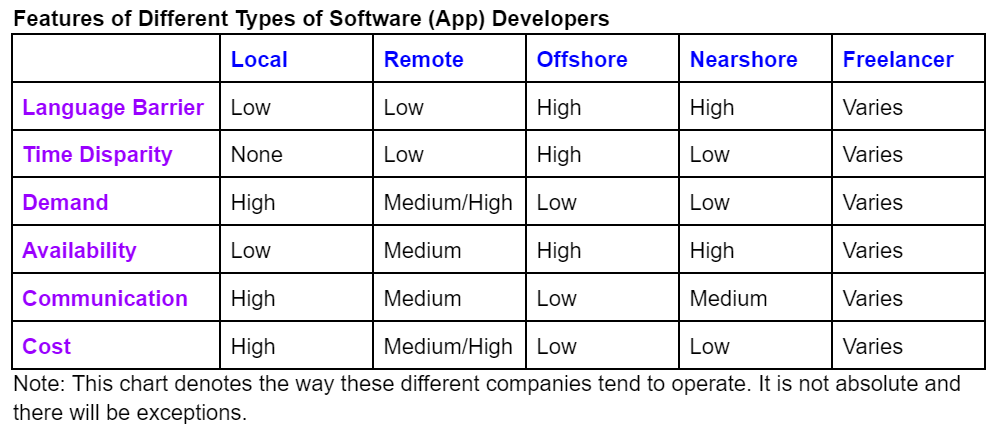Tag: types of software development companies
What Are the Different Types of App Development Companies?

When choosing an app development company for your project, there’s quite a few types of companies you can select from. You can pick a local software development company, a company on the other side of the world, or something in between. App development can be a costly investment, so you may want to do your research to pick the best app development company for your business, organization, or institution. We’re going to discuss the different types of app development companies and some pros and cons of each so you can make an informed decision when you’re ready to choose a developer for your app development project.
The types of software development companies we’re going to discuss are as follows:
Keep in mind that we’re going to describe and compare how these different types of app development companies tend to be, and this comparison is not absolute. You can also look at this chart for a side-by-side comparison:

Onshore Development
With onshore development companies, the developers live and work within the United States, though not necessarily in the same state or location as the product owner. With onshore development, the developer and the product owner live within a few time zones of each other and can usually communicate without time differences being a major factor. Both the developer and the product owner are often native English speakers so language tends to not be as much of a barrier. Due to these factors, onshore developers are often in higher demand. They also tend to charge a more premium price than development companies who reside in locations outside of the United States, though that will differ from company to company. It is worth noting that some onshore development companies outsource some of their work to offshore or nearshore developers to keep their costs down. If that is a concern, then you may want to ask your prospective developer about their outsourcing practices prior to hiring them. There are two different types of onshore development companies: remote development companies and local development companies.
Local Development Companies
To summarize, local development companies offer the following:
Language Barriers – Language barriers can exist, but there tends to be fewer problems.
Time Disparity – Both product owner and developer are within the same time zone.
Demand – Tends to be in the highest demand.
Availability – Initial contact may be difficult to achieve, they may have a waiting list, and they may be more selective in the projects they take.
Communication – Regular one-on-one, in person meetings can be coordinated and scheduled. Cost – Tends to charge a premium price for their services.
Remote Development Companies
To summarize, remote development companies offer the following:
Language Barriers – Language barriers can exist, but there tends to be fewer problems.
Time Disparity – No more than a few hours difference in time.
Demand – They tend to charge a more premium price than offshore and nearshore companies. Availability – They may be less available to take on projects than offshore or nearshore companies.
Communication – Remote development companies tend to rely on online communication platforms and phone calls and may sometimes have problems with coordinating meetings.
Cost – Tends to charge a more premium price for their services which is often based on demand.
Offshore Development Companies
To summarize, offshore development companies offer the following:
Language Barriers – A mutual language and idea barrier may exist between the app founder and an offshore developer due to English not being the developers’ native language, or they may have a difficult to decipher accent. This communication barrier can go both ways.
Time Disparity – Often live in totally different time zones with a 10-15 hour difference in time. Demand – Tends to be in lowest demand so they are often easy to acquire.
Availability – Tends to be readily available to take on new projects.
Communication – Meetings may be difficult to arrange and may occur at awkward times. Cost – Often charges a less premium price for their services.
Nearshore Development Companies
To summarize, nearshore development companies offer the following:
Language Barriers – Except for Canada in some cases, English is usually not the developers’ native language, so definite barriers can exist.
Time Disparity – No more than a few hours’ difference in time.
Availability – Tends to be available to take on new projects.
Communication – Remote development companies tend to rely on online communication platforms and phone calls and may sometimes have problems with coordinating meetings.
Cost – Tends to charge a less premium price than onshore developers.
Demand – Tends to be in less demand than local or remote developers.
Freelance Developers
Software development freelancers can be located in the local area or found anywhere within the United States or even abroad. Their availability for meetings with product owners, whether those meetings are in person or via Zoom, can vary depending on the amount of clients the developer has and what office hours they choose to keep. Their price can also vary widely depending on their knowledge, experience level, and location. Freelance developers, due to being single entities and lacking a team, sometimes do not possess the knowledge to complete a software project as specified. Freelancers may also lack the means to test a product thoroughly before it is launched. Due to these factors, a freelancer may sometimes abandon a project before completion or the project is delivered incomplete.
Each freelance developer is different so they can fit anywhere within the spectrum of the others. The biggest thing to note, however, is that they may not have the knowledge or skills to complete the job they were hired for.
We hope that this information helps you find the right software developer for your unique project and circumstances. Matraex is an app development located in Boise, Idaho, and we would provide the app development answers that you need so you can be an informed consumer. Check out Matraex’s other blogs for answers to other questions you may have. Ones that may be of particular interest to you include “How Much Does a Custom App Cost?” and “What Are Problems that Occur When Developing an App?” Can’t find an answer to your question? Contact us directly or give us a ring at (208) 344-1115. Your question may even become an upcoming blog.
Sign up to receive answers to your questions delivered directly to your inbox!
